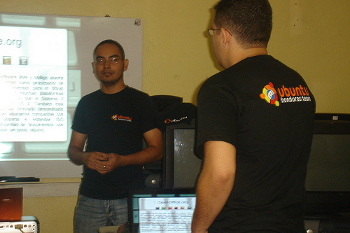
This week we’re travelling to Central America to visit the Ubuntu Honduras team, a LoCo true to the Ubuntu ethos and a mission of their own: encourage and promote the use of free technology through Ubuntu in the Republic of Honduras.
One of the most special activities the Honduran team organises to pursue this noble goal are their Ubuntu School Tours, a series of events where they travel to schools around the country and talk to students about Ubuntu. The idea is to promote the use of Open Source and raise awareness on its significance among students and teachers in educational institutions.
In words of Diego Turcios, the team contact lead, the idea is that “more and more people in Honduras learn about Ubuntu and Free Software and see it as an excellent Operating System option for laptops, desktops and servers. We also want to show that with Ubuntu everyone, be it home users or companies, have all the applications they need, such as a web browser, word processor, spreadsheed editor, instant messaging and others.”
Despite the political unrest in the country, which forced them to cancel many presentations, they showed their strong determination and great team organization in running two School Tour events last year, both with great success. In particular, they were at the Master School and at the Tridentino Institute in San Pedro Sula, the second biggest city in Honduras, in which we’ll focus to learn more on the event.
It was in the morning on the last Saturday of September last year, and during that time, they managed to provide a very complete overview of the team, Ubuntu and Open source in general. They started with a brief introduction to the Honduran team, followed by a presentation about what Open Source is and why Ubuntu is the OS of their choice. Next up was a demonstration of free office suite applications, GNU/Linux distributions and the four Free Software freedoms, followed by a showcase of Compiz which left more than one with their mouths open. The grand finale was an installation workshop and Q&A session, after which they left Ubuntu installed in one of the school’s machines and gave them a LiveCD to share.
From the testimonials of those present it was a very interesting experience: 20 students attended, showing a lot of enthusiasm in the subject, and who were in the end invited to join the LoCo and to participate in future team activities, which was also received with great interest.
All in all, another great example of the Ubuntu LoCo culture and spirit!
Links
- The Ubuntu Honduras Team
- Located in Honduras, Central America
- Wiki
- Website
- Team members
- Forum
- Mailing list (Archives and subscription)
- IRC chat at #ubuntu-hn on Freenode
| Do you have an interesting LoCo Story to tell? If you have organized an event, performed some work/advocacy in your local community, have built some resources, performed meetings or installfests, please email David (david.planella AT ubuntu DOT com) or add it to the list of proposed stories. Do remember to send a picture to accompany the story! |